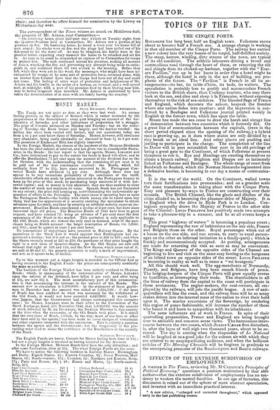TOPICS OF THE DAY.
THE CINQUE PORTS.
BOULOGNE has long been half an English town. Folkstone seems about to become half a French one. A strange change is working
in that old member of the Cinque Ports. The railway has carried a new colony into the very bosom of its torpid, half-fishified society. The steep, narrow, winding, dirty streets of the town, are typical of its old condition. The athletic labourers driving a broad and commodious road through the heart of them, or removing the silt and shingle from its choked-up harbour, together with the "East- em Pavilion," run up in hot haste in order that a hotel might be there, although the hotel is only in the act of building, are pro- phetic of the future. The " Pavilion " is French in all its ar- rangements—its bar, its table d'hôte, its beds, its waiters. The speculation is probably less to gratify and accommodate French visiters to the British shore, than Cockney tourists, who may there look at the sea, and dine and sleep A la Francaise, without exposing themselves to the risk of sea-sickness. The blended flags of France and England, which decorate the saloon, bespeak the frontier where one nation fades into another ; and the impression is con- firmed by a Boulogne and Folkstone journal printed weekly in English at the former town, which lies upon the table. Steam has made the sea cease to draw the harsh and abrupt line of demarcation between two countries which it formerly did. On a great line of communication between the capitals, (even in the short period elapsed since the opening of the railway,) a hybrid race is growing up, as it does where states are only divided by a tiny brook or an ideal line. And other places are pushing and jostling to participate in the change. The completion of the line to Dover will in part reestablish that port in its old privilege of being a great gate to the Continent, of which Folkstone at present threatens to rob it. Rye and Hastings are exerting themselves to obtain a branch railway. Brighton and Dieppe are as intimately linked as Folkstone and Boulogne. The whole range of coast from Sandwich to Seaford, which the Norman Monarchs regimented into a defensive barrier, is becoming in our day a means of communica- tion.
It is the way of the world. On the Continent, walled towns turn their fortifications into promenades ; and on a grander scale the same transformation is taking place with the Cinque Ports.
Easy and pleasant by-ways to France are constructing over their mounds. The British Channel, like the glacis and ditches of the cities alluded to, is becoming the pleasure-drive of Majesty. It is to England what the drive in Hyde Park is to London. Con- tagious sympathy draws the Majesty of France to the other side
of the Channel : LOUIS PHILIPPE has positively made two attempts to take a pleasure-trip in a steamer, and he at all events keeps a barge.
This great " highway of waters" is becoming a populous Street; England representing the row of habitations on the one side, France and Belgium those on the other. Royal personages whisk out of a house on the one side and run across, to carry to royal person- ages on the other an informal invitation to a family-party ; which is frankly and unceremoniously accepted. At parting, arrangements are made for returning the visit as soon as may be convenient. The Kings and. Queens of the opposite sides of the Channel are
beginning to live and visit on the same easy footing as the burgesses of an inland town on opposite sides of the street. Louts PHILIPPE is becoming in reality as well as in name a " roi bourgeois."
All this should work well. The egg-merchants of Normandy, Picardy, and Belgium have long been stanch friends of peace. The lodging-keepers Of the Cinque Ports will grow equally averse to hostilities, as interrupting their trade. The shareholders in all the lines of railway from the capital to the coast will participate in those sentiments. The engine-makers, the coal-owners, all em- ployed by the railways, will join the pacific league. A row of anti- quarrellers will line the coast, and the railway lines will be so many stakes driven into the internal mass of the nation to rivet their hold upon it. The marine excursions of the Sovereign, by rendering this region of peace fashionable, will increase the number of those who haunt it and learn to sympathize with its inhabitants. The same influences are at work in France. In spite of their quarrelling propensities, France and England are being brought
over to amicable and common sense views. The harmonious inter- course between the two coasts, which JULIUS C2ESAR first disturbed, is, after the lapse of well nigh two thousand years, about to be re- stored. The day is coming when the rhapsodies of Le National will be laughed at as a good joke for the solemn air with which they are uttered to an unsympathihing audience' and when the bellicose articles of The Morning Chronicle will be forgiven in gratitude to the enterprising promoter of the Southampton and Rouen railways.


























 Previous page
Previous page